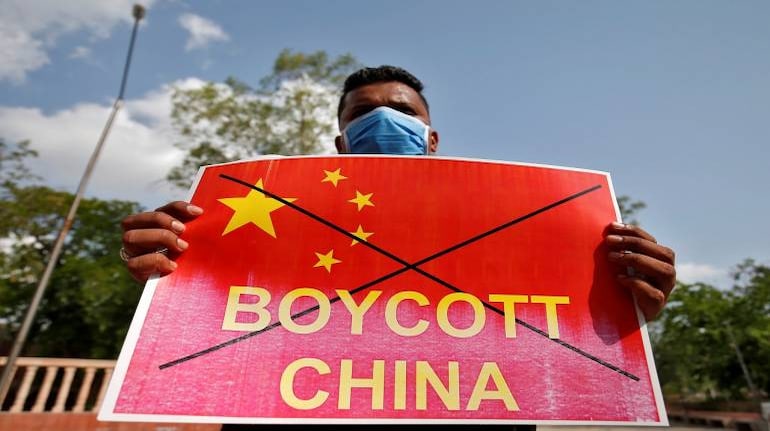



Once again India and China are engaged in border skirmishes, something that has assumed a predictable regularity. It’s not yet three years since both neighbours were standing eyeball to eyeball over the Doklam issue.
This time around the confrontation in eastern Ladakh has been characterised with a certain brutality. While the authorities concerned are sorting out the intricacies, once again calls for boycotting China economically are reverberating throughout India. ‘Boycott Chinese goods’ was trending on social media, and messages and videos describing how much the Chinese skim Indians, and why we should boycott Chinese goods, were flying thick and fast throughout social media channels.
The Confederation of All India Traders (CAIT), a powerful union of 70 million local traders, has decided to step up its nationwide movement against Chinese goods. Also, currently imports of more than 100 goods are under various stages of anti-dumping action.
This is not the first time that such calls for protest and economic boycott of China are taking place. During every confrontation there are loud calls for an economic boycott, but as soon as a breakthrough is announced all such calls are forgotten, slogans are withdrawn and its business as usual.
Weaponising trade is probably one of the best non-violent ways to deal with a hegemon such as the People’s Republic of China. Otherwise too, the adverse balance of payment has long been an issue, though many believed that benefits would accrue in bilateral ties by incentivising China to seek peace with India. That has not happened, and there are too many irritants in the relationship. Even if China is more attracted by the markets of the European Union and the United States, the Indian market does matter to it. So, what happens now?
Boycotting China is easier said than done. China is India’s second-largest trading partner after the US, and bilateral trade stood at almost $93 billion, skewed in favour of China with India’s trade deficit at $53.56 billion. The Trade Promotion Council of India has warned that an immediate boycott of Chinese goods and import substitution is unrealistic, given that many industries are dependent on Chinese imports. A sudden boycott would further disrupt supply chains already disrupted by COVID-19, the final brunt of which will be borne by ordinary consumers. On the other hand there are projections of plummeting Indian exports to China, which will further widen India’s trade deficit with China.
Yet, there have long been the awareness and the acknowledgement of the need to wean Indian market away from its dependence on China. COVID-19 has also focussed our attention on the here and now, teaching us lessons in self-sufficiency, as the migrant crisis has demonstrated. To that end the government passed legislation to curb foreign direct investment (FDI) flows from China.
Moreover, drawing in large part from the Chinese experience, has been the initiative to make India a manufacturing hub. It was in that spirit that initiatives such as Make in India, Digital India and others were launched. The GST was introduced in order to incentivise FDI. However, countries wanting to invest and move businesses to India from China still face hurdles, in spite of India’s advantages over the latter — knowledge of English, long coastline with good ports, strategic location, and a younger population. Taiwan, which partially fuelled China’s growth, is one such country.
With companies in China and ASEAN countries reaching the saturation point, Taiwan has been looking to move its businesses and invest majorly in the Indian economy. In fact, Chung-kwan Tien, the Head of the Taipei Economic and Cultural Center in India, in a private conversation to a group of journalists of which this author was also a part, said that India was perhaps the most important country in Taiwan’s New Southbound Policy launched in 2016.
For instance, Taiwan’s investments in India amounted to $360 million in 2018 — almost equalling China’s. Bilateral trade between India and Taiwan stood at $7.5 billion in 2018. One of Taiwan’s fortes is smart cities, a hundred of which the Government of India is committed to building.
According to a World Economic Forum report, Taiwan is in the midst of an innovation-driven economy. Currently 103 Taiwanese companies are present in India, and land has already been acquired in Bengaluru to set up the first Taiwan Technology International Park, which is to house 100 IT companies by 2022. Yet, Taiwanese businesses lament that they do not have the same level playing field in India as countries such as Japan and South Korea do. Thus, Taiwan has to pay 10 percent higher taxes than them. It is thus seeking to speed up a Free Trade Agreement with India.
Much of the manufacturing that Taiwan wants to move into India are of items that India depends on China for, such as electronic machinery. Besides, it would generate much needed employment. Thus, boosting trade and investment opportunities with countries such as Taiwan could be steps to pragmatically but resolutely wean the country away from its economic dependency on China.
Aditi Bhaduri is a journalist and political analyst. Views are personal.Discover the latest Business News, Sensex, and Nifty updates. Obtain Personal Finance insights, tax queries, and expert opinions on Moneycontrol or download the Moneycontrol App to stay updated!
Find the best of Al News in one place, specially curated for you every weekend.
Stay on top of the latest tech trends and biggest startup news.